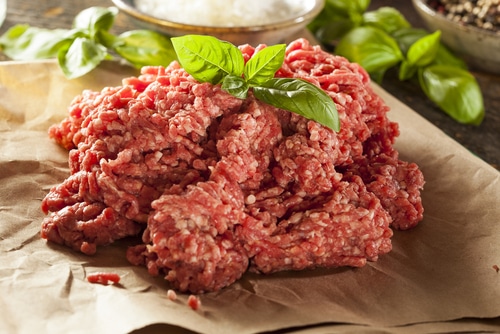 There’s a trend towards reducing the amount of meat in our diets. More people are choosing a “flexitarian” approach to dining, eating more of a plant-based diet with less frequent consumption of meat. That’s not necessarily a bad thing. Some research shows a link between red meat, especially processed meat, and some forms of cancer.
There’s a trend towards reducing the amount of meat in our diets. More people are choosing a “flexitarian” approach to dining, eating more of a plant-based diet with less frequent consumption of meat. That’s not necessarily a bad thing. Some research shows a link between red meat, especially processed meat, and some forms of cancer.
For the health-conscious person who’s not ready to give up meat or even beef, there’s another option – organic meat. If you haven’t looked at the prices of organic beef, you may be surprised at how expensive it can be – up to twice as much. With that kind of price tag is it really worth buying organic meat? Here are things to consider when deciding between conventional meat and organic beef.
The Antibiotic Issue
Antibiotic resistance is a growing problem. There are bacterial infections that no longer respond to the antibiotics that are available. Do you know where most of the antibiotics produced are going? Livestock producers use them to reduce the risk of infection in the animals they’re raising and to maximize their growth. Not only does this contribute to the problem of antibiotic resistance, but it also exposes you to antibiotics when you eat the meat. These antibiotics can also destroy gut-friendly bacteria in your intestines that keep your digestive tract and immune system healthy. Plus, animals release these antibiotics into the environment as waste where they end up in the water supply. There have been a number of reports of antibiotics in drinking water. Organic livestock is not exposed to these antibiotics.
Are There Hormones in Your Meat?
Cattle raised on factory farms receive hormones that help them grow larger and produce more milk. There are concerns these hormones may have hormone effects in humans too. It’s not clear how much of the hormones humans absorb when we eat non-organic meat. If there is significant absorption of these hormones it may increase the risk of some cancers like breast cancer that are fueled by hormones like estrogen. Animals raised organically aren’t exposed to these hormones.
Pesticides
Conventionally-raised cattle don’t eat spend time in the meadows eating grass. Instead, they eat a diet of grains that have been sprayed with pesticides. These pesticides are stored in their tissues and make their way into your body when you eat the meat. How much pesticide residues in meat impact health is unknown but it may be worth choosing organic to avoid them.
The GMO Issue
Cows on factory farms eat a diet of grains, usually corn. Most of the corn produced now is genetically-modified. If you’re trying to avoid GMOs in any form, organic beef is the way to go. Organically-raised cattle eat a diet of grass and are raised on a certified organic pasture. What they eat is certified organic as well. Anything that’s certified organic must be free of GMOs.
Healthier Fats?
Some research shows grass-fed beef has higher levels of heart-healthy omega-3 fats than grain-fed beef. They also have higher levels of CLA, a fatty acid that may help with weight management and have other health benefits as well. Grass-fed beef is also lower in saturated fat and has a higher level of antioxidants.
The Bottom Line?
Organic beef may cost more but you get the benefits of no unnecessary antibiotics, no added growth hormones, GMO-free, no intentional exposure to pesticides and meat that has more heart-healthy fats and antioxidants. Here’s something to remember – grass-fed and organic aren’t necessarily the same. You can’t assume beef that’s organic comes from an animal that was 100% grass-fed. Organically-raised cattle eat only organic feed and must get 30% of their diet from a pasture. That means the remainder of their diet can come from organic, non-GMO grains.
Grass-fed beef that isn’t organic may still have been exposed to hormones and antibiotics, although less likely than animals raised in factory farms. The grass the cattle ate could have been sprayed with pesticides as well. When you buy grass-fed, it’s not organic unless you see the organic certification seal on the package. Of course, the best of all worlds is grass-fed, organic. If you don’t mind paying more, grass-fed and organic beef is nutritionally superior and safest from a health standpoint.
Take-Home Points
Grass-fed beef has nutritional benefits over grain-fed beef – more omega-3s, CLA, antioxidants.
Grass-fed beef isn’t necessarily organic or free of antibiotics, GMOs, pesticides, etc. Look for the certified organic seal for confirmation that a product is organic beef.
Both are better for the welfare of the animal.
Grass-fed and organic beef combines the best of both – safety and nutrition.
Worst of all? Processed meat – avoid it at all costs.
References:
NYU Langone Medical Center. “The Controversy Over Added Hormones in Meat and Dairy”
Asia Pac J Clin Nutr. 2006;15(1):21-9.
J Sports Med Phys Fitness. 2006 Dec;46(4):570-7.
Am J Clin Nutr May 2007 vol. 85 no. 5 1203-1211
Nutrition Journal. “A review of fatty acid profiles and antioxidant content in grass-fed and grain-fed beef”
WebMD. “Safer Food for a Healthier You”
National Cooperative Grocers Association. “Meat and Poultry”
Medscape Family Medicine. “Red Meat and Cancer: What’s the Beef?”
Related Articles By Cathe:
4 Health Benefits of Grass-Fed Beef That Are Not Contained in Grain-Fed
Why Grass-Fed Beef Is Healthier

